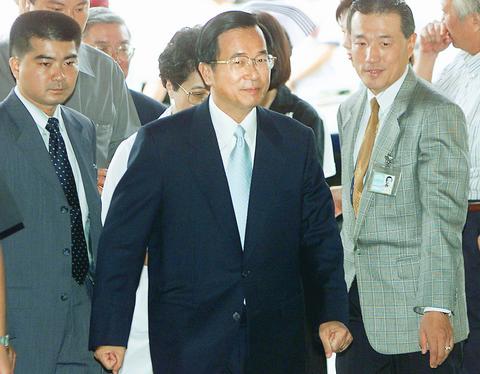DPP officials restated the party's position of sticking to the "five no's" policy, after Beijing issued a tough-worded warning following President Chen Shui-bian's (陳水扁) remarks when he referred to Taiwan and China as "separate states on either side of the Taiwan Strait."
Expressing his regret over China's denunciation, DPP Director of the Chinese Affairs Department Chen Chung-hsin (
Responding to China's accusation that the president was steering the nation toward independence, Chen Chung-hsin said, "we are not surprised by China's reaction. But we'd like to reiterate that the DPP will continue to make good on the `five no's' policy."

PHOTO: REUTERS
In his strongest comments since he took office in May 2000, the president said on Saturday that there is one country on either side of the Taiwan Strait and that Taiwan must seriously consider passing legislation to prepare for a referendum to protect the country's sovereignty.
In response, Beijing warned the president that his call for the legislation would seriously damage relations between the two sides, and "bring Taiwan into disaster."
The spokesman of China's Taiwan Affairs Office, Li Weiyi (李維一), said Chen's statements proved that his "five no's" policy was merely an expedient measure aimed at deceiving the people of Taiwan and world opinion.
When he took office, Chen vowed to cling to the "five no's policy" as long as Beijing has no intention of using military force against Taiwan.
The "five no's" policy states that Taiwan will: not declare independence; not change the name of the nation; not change the Constitution to include the so-called "state-to-state" model of cross-strait relations; not promote a referendum to change the status quo regarding the question of independence or unification and not abolish the National Reunification Council or the National Reunification Guidelines.
Regarding China's labeling of the president as a splittist who seeks to declare independence, Chen Chung-hsin said the statement shows that "China has over-interpreted the president's remarks."
He said that the president's remarks aimed to underscore Taiwan's independent status in accordance with the party's "1999 resolution regarding Taiwan's future."
Considered the party's primary guideline when dealing with cross-strait issues, the resolution declares that Taiwan is an independent sovereign state whose name is the ROC. Any changes regarding this status quo must be collectively determined by all people in Taiwan through a public referendum.
According to the DPP, Taiwan's independence is a reality, the referendum would only apply if Taiwanese wanted to decide if they want to reunite with China.
Executive Director of the DPP's Policy Research and Coordinating Committee Lin Cho-shui (
The poll indicates that 54 percent of the respondents approved of Chen's statements that Taiwan and China are two different nations, whereas 62 percent of the respondents agreed to use a referendum to decide Taiwan's future.

POSITIVE DEVELOPMENT: Japan and the US are expected to hold in-depth discussions on Taiwan-related issues during the meeting next month, Japanese sources said The holding of a Japan-US leaders’ meeting ahead of US President Donald Trump’s visit to China is positive news for Taiwan, former Japan-Taiwan Exchange Association representative Hiroyasu Izumi said yesterday. After the Liberal Democratic Party’s landslide victory in Japan’s House of Representatives election, Japanese Prime Minister Sanae Takaichi is scheduled to visit the US next month, where she is to meet with Trump ahead of the US president’s planned visit to China from March 31 to April 2 for a meeting with Chinese President Xi Jinping (習近平). Japan and the US are expected to hold in-depth discussions on Taiwan-related issues during the

‘LIKE-MINDED PARTNER’: Tako van Popta said it would be inappropriate to delay signing the deal with Taiwan because of China, adding he would promote the issue Canadian senators have stressed Taiwan’s importance for international trade and expressed enthusiasm for ensuring the Taiwan-Canada trade cooperation framework agreement is implemented this year. Representative to Canada Harry Tseng (曾厚仁) in an interview with the Central News Agency (CNA) said he was increasingly uneasy about Ottawa’s delays in signing the agreement, especially as Ottawa has warmed toward Beijing. There are “no negotiations left. Not only [is it] initialed, we have three versions of the text ready: English, French and Mandarin,” Tseng said. “That tells you how close we are to the final signature.” Tseng said that he hoped Canadian Prime Minister Mark Carney

Taiwan has received more than US$70 million in royalties as of the end of last year from developing the F-16V jet as countries worldwide purchase or upgrade to this popular model, government and military officials said on Saturday. Taiwan funded the development of the F-16V jet and ended up the sole investor as other countries withdrew from the program. Now the F-16V is increasingly popular and countries must pay Taiwan a percentage in royalties when they purchase new F-16V aircraft or upgrade older F-16 models. The next five years are expected to be the peak for these royalties, with Taiwan potentially earning

President William Lai (賴清德) yesterday bestowed one of Taiwan’s highest honors on Saint Vincent and the Grenadines (SVG) Ambassador Andrea Clare Bowman in recognition of her contributions to bilateral ties. “By conferring the Order of Brilliant Star with Grand Cordon on Ambassador Bowman today, I want to sincerely thank her, on behalf of the Taiwanese people, for her outstanding contribution to deepening diplomatic ties between Taiwan and SVG,” Lai said at a ceremony held at the Presidential Office in Taipei. He noted that Bowman became SVG’s first ambassador to Taiwan in 2019 and